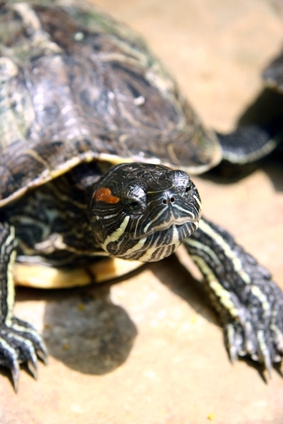Cats are prone to feline bladder infections brought on by cystitis. Sometimes you hear a cat urinary blockage referred to as Feline Lower Urinary Tract Disease or FLUTD. This can be a deadly condition, but it is also preventable. You can take some simple steps to recognize the symptoms of a blockage in cat and prevent the onset of a FLUTD.
Cystitis is a condition of FLUTD and it means a inflammation of the bladder. Here are some symptoms of cystitis to be watch for when you suspect a cat urinary blockage. If your cat starts exhibiting these symptoms, you need to take quick action. Blockages must be cleared withing 72 hours or the condition is fatal.
If you see your cat is more lethargic than usual or displays odd potty behavior, you should suspect a problem. You may notice you cat licking his genital area a lot more than normal, straining while straddling the litter box, or even urinating outside of the litter box. If he howls or cries while trying to urinate that is a really big clue that something is wrong. Also, if you notice blood in the urine and he begins to vomit. Its time to rush your cat to the vet.
Diagnosing a cat urinary blockage...
Your vet will feel your cat's bladder and can tell immediately if its distended with urine or the bladder may be very small, smaller than is normal. He may press on the bladder to try to get your cat to expel urine. If this doesn't work the next step is to insert a needle into your cat's bladder to extract a sample. The good news is that the needle is far less painful than the cat urinary blockage.
Next the vet will evaluate the content of the urine. The test determines if there are crystals, bacteria, blood, white blood cells and the pH level of the urine. Your vet may even have to take x-Rays to identify stones, tumors or a birth defect causing the problem.
Treatment...
If cystitis was brought on by crystals irritating your cat's bladder, then the nutritional content of these crystals will help your vet determine what path to take to change your cat's diet. Your vet may prescribe a prescription diet. You can also add a pinch of a homeopathic remedy to help your cat recover from the symptoms of a blockage in cat and prevent a repeat bout of cystitis.
If your cat has a bacterial infection the vet may want to prescribe an antibiotic. Antibiotics are under more scrutiny these days because they cause more long-term problems in the body. If the incorrect antibiotic was prescribed it will often aggravate a bladder infection and make it worse.
Instead of a prescription antibiotic, talk with your vet about taking a natural approach to recovery from a cat urinary blockage. Holistic vets recognize the power of homeopathic remedies containing cantharis, uva ursi, and berberis vulgaris.
So there you have it. You should be ready to spot symptoms of a blockage in cat and help you cat get over the disorder. In fact, you can get him on a preventative fast tract by adding a little natural remedy to his diet. Always make sure he has plenty of fresh water to drink. Do this and your cat will flush out the toxins in his urinary tract keeping him healthy and preventing a recurring cat urinary blockage.

 The Benefits of Adopting an Older Pet
Everyone love
The Benefits of Adopting an Older Pet
Everyone love
 How to Take Care of a Dove's Baby
How to Take Care of a Dove's Baby
How to Take Care of a Dove's Baby
How to Take Care of a Dove's Baby
 Dogs and Water Safety
Water is a gr
Dogs and Water Safety
Water is a gr
 How to Care for a Baby Cooter Turtle
How to Care for a Baby Cooter Turtle
H
How to Care for a Baby Cooter Turtle
How to Care for a Baby Cooter Turtle
H
 How to Care for an Indoor Rabbit
How to Care for an Indoor Rabbit
How t
How to Care for an Indoor Rabbit
How to Care for an Indoor Rabbit
How t